Analysis of Entrepreneurship and Small Business Management Principles
VerifiedAdded on 2021/02/17
|18
|5349
|23
Report
AI Summary
This report examines entrepreneurship and small business management, covering various types of entrepreneurial ventures, including small business, scalable start-up, large company, and social entrepreneurship. It analyzes the similarities and differences between these ventures, highlighting the role of entrepreneurs in the economy. The report interprets data and statistics to illustrate the impact of micro and small businesses on the UK economy, emphasizing their contribution to employment and GDP growth. It also explores the importance of small businesses and start-ups to the social economy. Furthermore, the report delves into the characteristics of successful entrepreneurs, differentiating them from traditional business managers, and discusses how entrepreneurial personality traits reflect motivation and mindset. Finally, it provides examples of factors that can foster or hinder entrepreneurship. The report provides a comprehensive overview of the subject, offering valuable insights into the world of entrepreneurship and small business management.

Entrepreneurship and
Small Business
Management
Small Business
Management
Paraphrase This Document
Need a fresh take? Get an instant paraphrase of this document with our AI Paraphraser
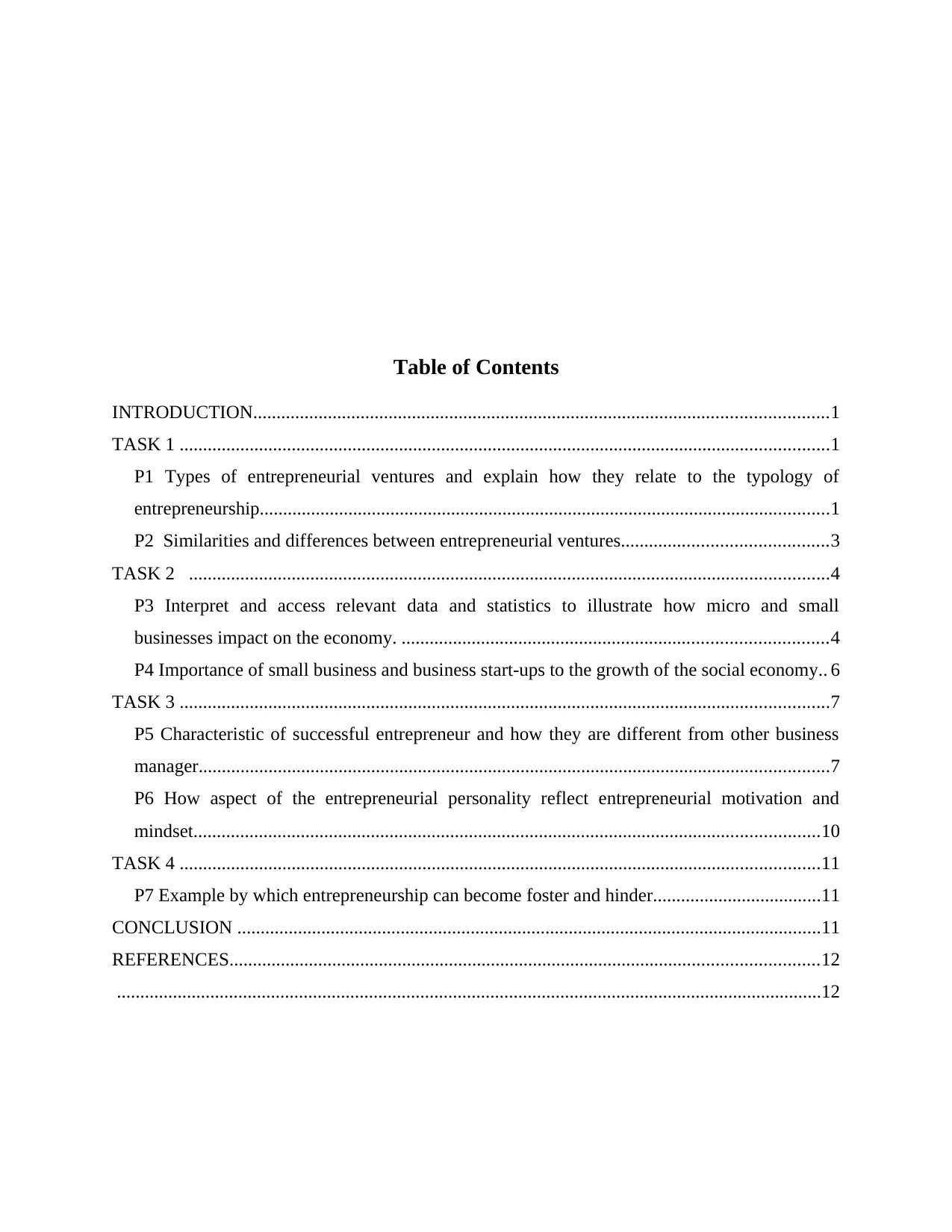
Table of Contents
INTRODUCTION...........................................................................................................................1
TASK 1 ...........................................................................................................................................1
P1 Types of entrepreneurial ventures and explain how they relate to the typology of
entrepreneurship..........................................................................................................................1
P2 Similarities and differences between entrepreneurial ventures............................................3
TASK 2 .........................................................................................................................................4
P3 Interpret and access relevant data and statistics to illustrate how micro and small
businesses impact on the economy. ...........................................................................................4
P4 Importance of small business and business start-ups to the growth of the social economy.. 6
TASK 3 ...........................................................................................................................................7
P5 Characteristic of successful entrepreneur and how they are different from other business
manager.......................................................................................................................................7
P6 How aspect of the entrepreneurial personality reflect entrepreneurial motivation and
mindset......................................................................................................................................10
TASK 4 .........................................................................................................................................11
P7 Example by which entrepreneurship can become foster and hinder....................................11
CONCLUSION .............................................................................................................................11
REFERENCES..............................................................................................................................12
.......................................................................................................................................................12
INTRODUCTION...........................................................................................................................1
TASK 1 ...........................................................................................................................................1
P1 Types of entrepreneurial ventures and explain how they relate to the typology of
entrepreneurship..........................................................................................................................1
P2 Similarities and differences between entrepreneurial ventures............................................3
TASK 2 .........................................................................................................................................4
P3 Interpret and access relevant data and statistics to illustrate how micro and small
businesses impact on the economy. ...........................................................................................4
P4 Importance of small business and business start-ups to the growth of the social economy.. 6
TASK 3 ...........................................................................................................................................7
P5 Characteristic of successful entrepreneur and how they are different from other business
manager.......................................................................................................................................7
P6 How aspect of the entrepreneurial personality reflect entrepreneurial motivation and
mindset......................................................................................................................................10
TASK 4 .........................................................................................................................................11
P7 Example by which entrepreneurship can become foster and hinder....................................11
CONCLUSION .............................................................................................................................11
REFERENCES..............................................................................................................................12
.......................................................................................................................................................12

⊘ This is a preview!⊘
Do you want full access?
Subscribe today to unlock all pages.

Trusted by 1+ million students worldwide
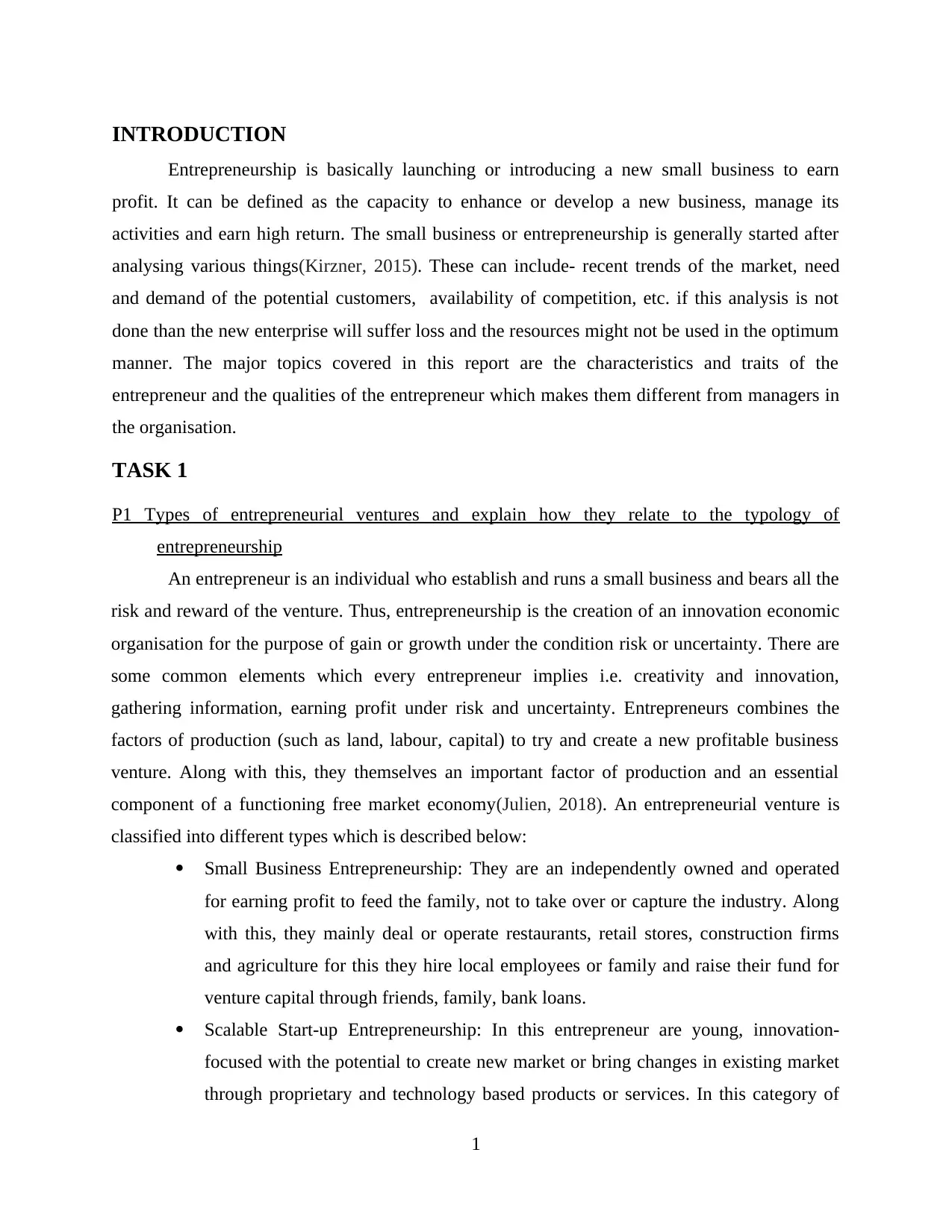
INTRODUCTION
Entrepreneurship is basically launching or introducing a new small business to earn
profit. It can be defined as the capacity to enhance or develop a new business, manage its
activities and earn high return. The small business or entrepreneurship is generally started after
analysing various things(Kirzner, 2015). These can include- recent trends of the market, need
and demand of the potential customers, availability of competition, etc. if this analysis is not
done than the new enterprise will suffer loss and the resources might not be used in the optimum
manner. The major topics covered in this report are the characteristics and traits of the
entrepreneur and the qualities of the entrepreneur which makes them different from managers in
the organisation.
TASK 1
P1 Types of entrepreneurial ventures and explain how they relate to the typology of
entrepreneurship
An entrepreneur is an individual who establish and runs a small business and bears all the
risk and reward of the venture. Thus, entrepreneurship is the creation of an innovation economic
organisation for the purpose of gain or growth under the condition risk or uncertainty. There are
some common elements which every entrepreneur implies i.e. creativity and innovation,
gathering information, earning profit under risk and uncertainty. Entrepreneurs combines the
factors of production (such as land, labour, capital) to try and create a new profitable business
venture. Along with this, they themselves an important factor of production and an essential
component of a functioning free market economy(Julien, 2018). An entrepreneurial venture is
classified into different types which is described below:
Small Business Entrepreneurship: They are an independently owned and operated
for earning profit to feed the family, not to take over or capture the industry. Along
with this, they mainly deal or operate restaurants, retail stores, construction firms
and agriculture for this they hire local employees or family and raise their fund for
venture capital through friends, family, bank loans.
Scalable Start-up Entrepreneurship: In this entrepreneur are young, innovation-
focused with the potential to create new market or bring changes in existing market
through proprietary and technology based products or services. In this category of
1
Entrepreneurship is basically launching or introducing a new small business to earn
profit. It can be defined as the capacity to enhance or develop a new business, manage its
activities and earn high return. The small business or entrepreneurship is generally started after
analysing various things(Kirzner, 2015). These can include- recent trends of the market, need
and demand of the potential customers, availability of competition, etc. if this analysis is not
done than the new enterprise will suffer loss and the resources might not be used in the optimum
manner. The major topics covered in this report are the characteristics and traits of the
entrepreneur and the qualities of the entrepreneur which makes them different from managers in
the organisation.
TASK 1
P1 Types of entrepreneurial ventures and explain how they relate to the typology of
entrepreneurship
An entrepreneur is an individual who establish and runs a small business and bears all the
risk and reward of the venture. Thus, entrepreneurship is the creation of an innovation economic
organisation for the purpose of gain or growth under the condition risk or uncertainty. There are
some common elements which every entrepreneur implies i.e. creativity and innovation,
gathering information, earning profit under risk and uncertainty. Entrepreneurs combines the
factors of production (such as land, labour, capital) to try and create a new profitable business
venture. Along with this, they themselves an important factor of production and an essential
component of a functioning free market economy(Julien, 2018). An entrepreneurial venture is
classified into different types which is described below:
Small Business Entrepreneurship: They are an independently owned and operated
for earning profit to feed the family, not to take over or capture the industry. Along
with this, they mainly deal or operate restaurants, retail stores, construction firms
and agriculture for this they hire local employees or family and raise their fund for
venture capital through friends, family, bank loans.
Scalable Start-up Entrepreneurship: In this entrepreneur are young, innovation-
focused with the potential to create new market or bring changes in existing market
through proprietary and technology based products or services. In this category of
1
Paraphrase This Document
Need a fresh take? Get an instant paraphrase of this document with our AI Paraphraser
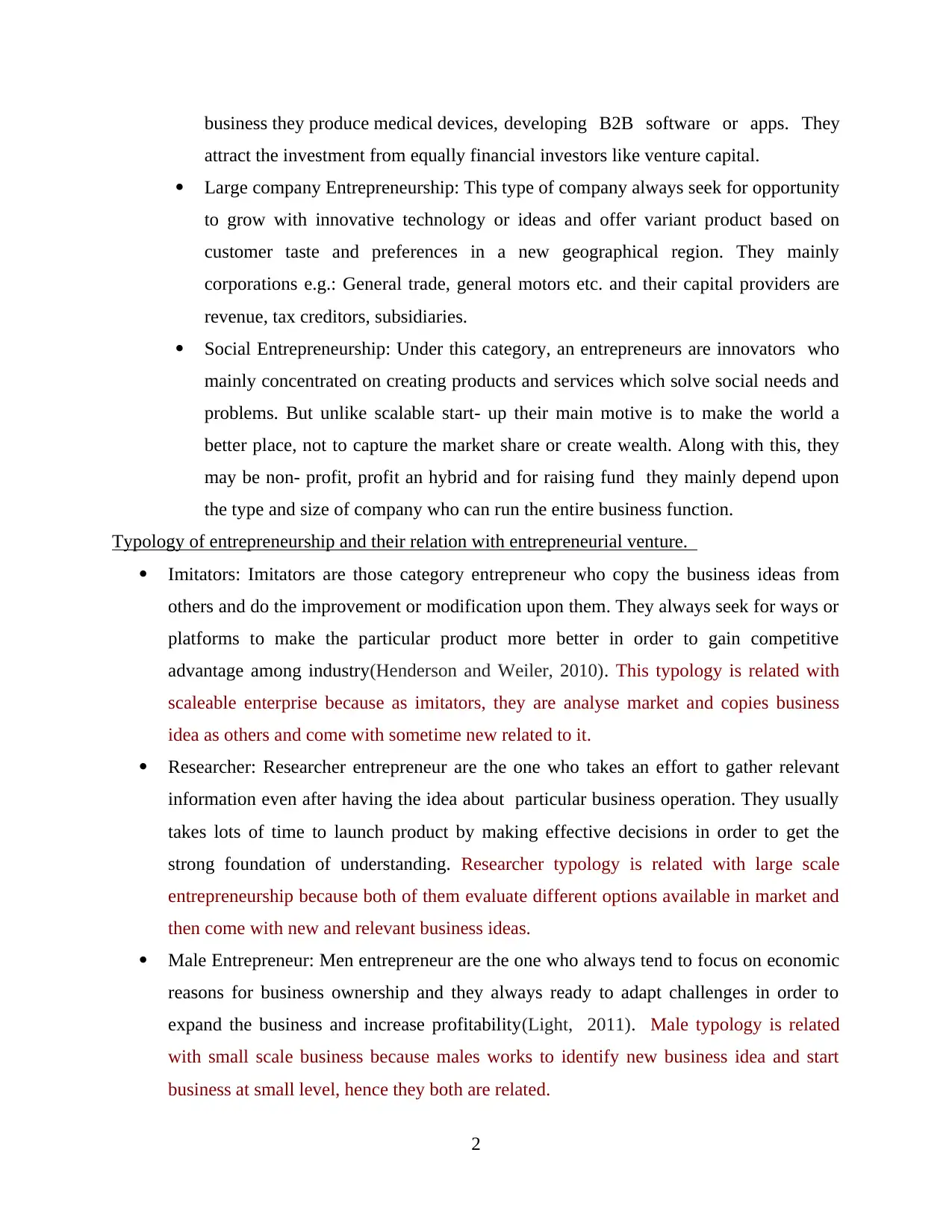
business they produce medical devices, developing B2B software or apps. They
attract the investment from equally financial investors like venture capital.
Large company Entrepreneurship: This type of company always seek for opportunity
to grow with innovative technology or ideas and offer variant product based on
customer taste and preferences in a new geographical region. They mainly
corporations e.g.: General trade, general motors etc. and their capital providers are
revenue, tax creditors, subsidiaries.
Social Entrepreneurship: Under this category, an entrepreneurs are innovators who
mainly concentrated on creating products and services which solve social needs and
problems. But unlike scalable start- up their main motive is to make the world a
better place, not to capture the market share or create wealth. Along with this, they
may be non- profit, profit an hybrid and for raising fund they mainly depend upon
the type and size of company who can run the entire business function.
Typology of entrepreneurship and their relation with entrepreneurial venture.
Imitators: Imitators are those category entrepreneur who copy the business ideas from
others and do the improvement or modification upon them. They always seek for ways or
platforms to make the particular product more better in order to gain competitive
advantage among industry(Henderson and Weiler, 2010). This typology is related with
scaleable enterprise because as imitators, they are analyse market and copies business
idea as others and come with sometime new related to it.
Researcher: Researcher entrepreneur are the one who takes an effort to gather relevant
information even after having the idea about particular business operation. They usually
takes lots of time to launch product by making effective decisions in order to get the
strong foundation of understanding. Researcher typology is related with large scale
entrepreneurship because both of them evaluate different options available in market and
then come with new and relevant business ideas.
Male Entrepreneur: Men entrepreneur are the one who always tend to focus on economic
reasons for business ownership and they always ready to adapt challenges in order to
expand the business and increase profitability(Light, 2011). Male typology is related
with small scale business because males works to identify new business idea and start
business at small level, hence they both are related.
2
attract the investment from equally financial investors like venture capital.
Large company Entrepreneurship: This type of company always seek for opportunity
to grow with innovative technology or ideas and offer variant product based on
customer taste and preferences in a new geographical region. They mainly
corporations e.g.: General trade, general motors etc. and their capital providers are
revenue, tax creditors, subsidiaries.
Social Entrepreneurship: Under this category, an entrepreneurs are innovators who
mainly concentrated on creating products and services which solve social needs and
problems. But unlike scalable start- up their main motive is to make the world a
better place, not to capture the market share or create wealth. Along with this, they
may be non- profit, profit an hybrid and for raising fund they mainly depend upon
the type and size of company who can run the entire business function.
Typology of entrepreneurship and their relation with entrepreneurial venture.
Imitators: Imitators are those category entrepreneur who copy the business ideas from
others and do the improvement or modification upon them. They always seek for ways or
platforms to make the particular product more better in order to gain competitive
advantage among industry(Henderson and Weiler, 2010). This typology is related with
scaleable enterprise because as imitators, they are analyse market and copies business
idea as others and come with sometime new related to it.
Researcher: Researcher entrepreneur are the one who takes an effort to gather relevant
information even after having the idea about particular business operation. They usually
takes lots of time to launch product by making effective decisions in order to get the
strong foundation of understanding. Researcher typology is related with large scale
entrepreneurship because both of them evaluate different options available in market and
then come with new and relevant business ideas.
Male Entrepreneur: Men entrepreneur are the one who always tend to focus on economic
reasons for business ownership and they always ready to adapt challenges in order to
expand the business and increase profitability(Light, 2011). Male typology is related
with small scale business because males works to identify new business idea and start
business at small level, hence they both are related.
2
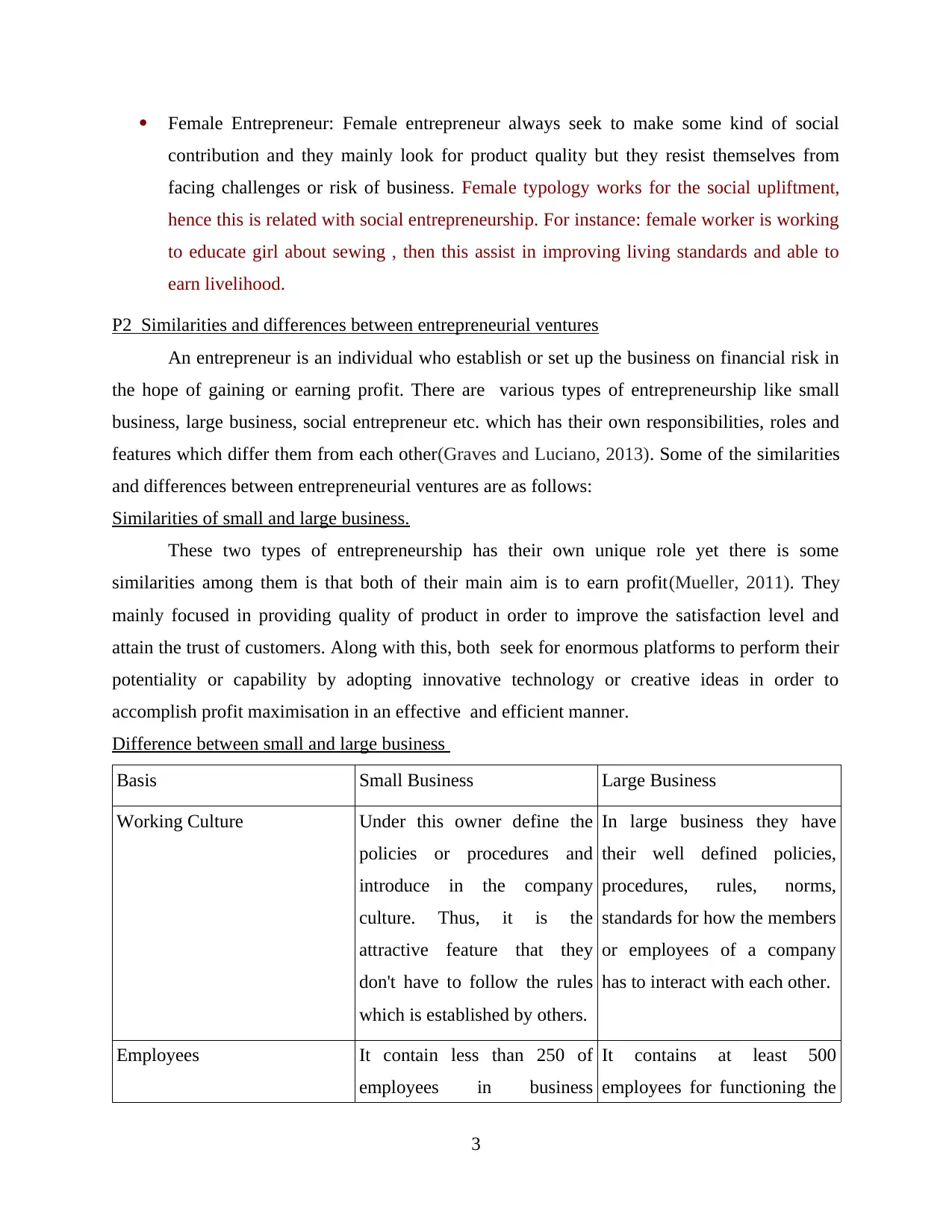
Female Entrepreneur: Female entrepreneur always seek to make some kind of social
contribution and they mainly look for product quality but they resist themselves from
facing challenges or risk of business. Female typology works for the social upliftment,
hence this is related with social entrepreneurship. For instance: female worker is working
to educate girl about sewing , then this assist in improving living standards and able to
earn livelihood.
P2 Similarities and differences between entrepreneurial ventures
An entrepreneur is an individual who establish or set up the business on financial risk in
the hope of gaining or earning profit. There are various types of entrepreneurship like small
business, large business, social entrepreneur etc. which has their own responsibilities, roles and
features which differ them from each other(Graves and Luciano, 2013). Some of the similarities
and differences between entrepreneurial ventures are as follows:
Similarities of small and large business.
These two types of entrepreneurship has their own unique role yet there is some
similarities among them is that both of their main aim is to earn profit(Mueller, 2011). They
mainly focused in providing quality of product in order to improve the satisfaction level and
attain the trust of customers. Along with this, both seek for enormous platforms to perform their
potentiality or capability by adopting innovative technology or creative ideas in order to
accomplish profit maximisation in an effective and efficient manner.
Difference between small and large business
Basis Small Business Large Business
Working Culture Under this owner define the
policies or procedures and
introduce in the company
culture. Thus, it is the
attractive feature that they
don't have to follow the rules
which is established by others.
In large business they have
their well defined policies,
procedures, rules, norms,
standards for how the members
or employees of a company
has to interact with each other.
Employees It contain less than 250 of
employees in business
It contains at least 500
employees for functioning the
3
contribution and they mainly look for product quality but they resist themselves from
facing challenges or risk of business. Female typology works for the social upliftment,
hence this is related with social entrepreneurship. For instance: female worker is working
to educate girl about sewing , then this assist in improving living standards and able to
earn livelihood.
P2 Similarities and differences between entrepreneurial ventures
An entrepreneur is an individual who establish or set up the business on financial risk in
the hope of gaining or earning profit. There are various types of entrepreneurship like small
business, large business, social entrepreneur etc. which has their own responsibilities, roles and
features which differ them from each other(Graves and Luciano, 2013). Some of the similarities
and differences between entrepreneurial ventures are as follows:
Similarities of small and large business.
These two types of entrepreneurship has their own unique role yet there is some
similarities among them is that both of their main aim is to earn profit(Mueller, 2011). They
mainly focused in providing quality of product in order to improve the satisfaction level and
attain the trust of customers. Along with this, both seek for enormous platforms to perform their
potentiality or capability by adopting innovative technology or creative ideas in order to
accomplish profit maximisation in an effective and efficient manner.
Difference between small and large business
Basis Small Business Large Business
Working Culture Under this owner define the
policies or procedures and
introduce in the company
culture. Thus, it is the
attractive feature that they
don't have to follow the rules
which is established by others.
In large business they have
their well defined policies,
procedures, rules, norms,
standards for how the members
or employees of a company
has to interact with each other.
Employees It contain less than 250 of
employees in business
It contains at least 500
employees for functioning the
3
⊘ This is a preview!⊘
Do you want full access?
Subscribe today to unlock all pages.

Trusted by 1+ million students worldwide
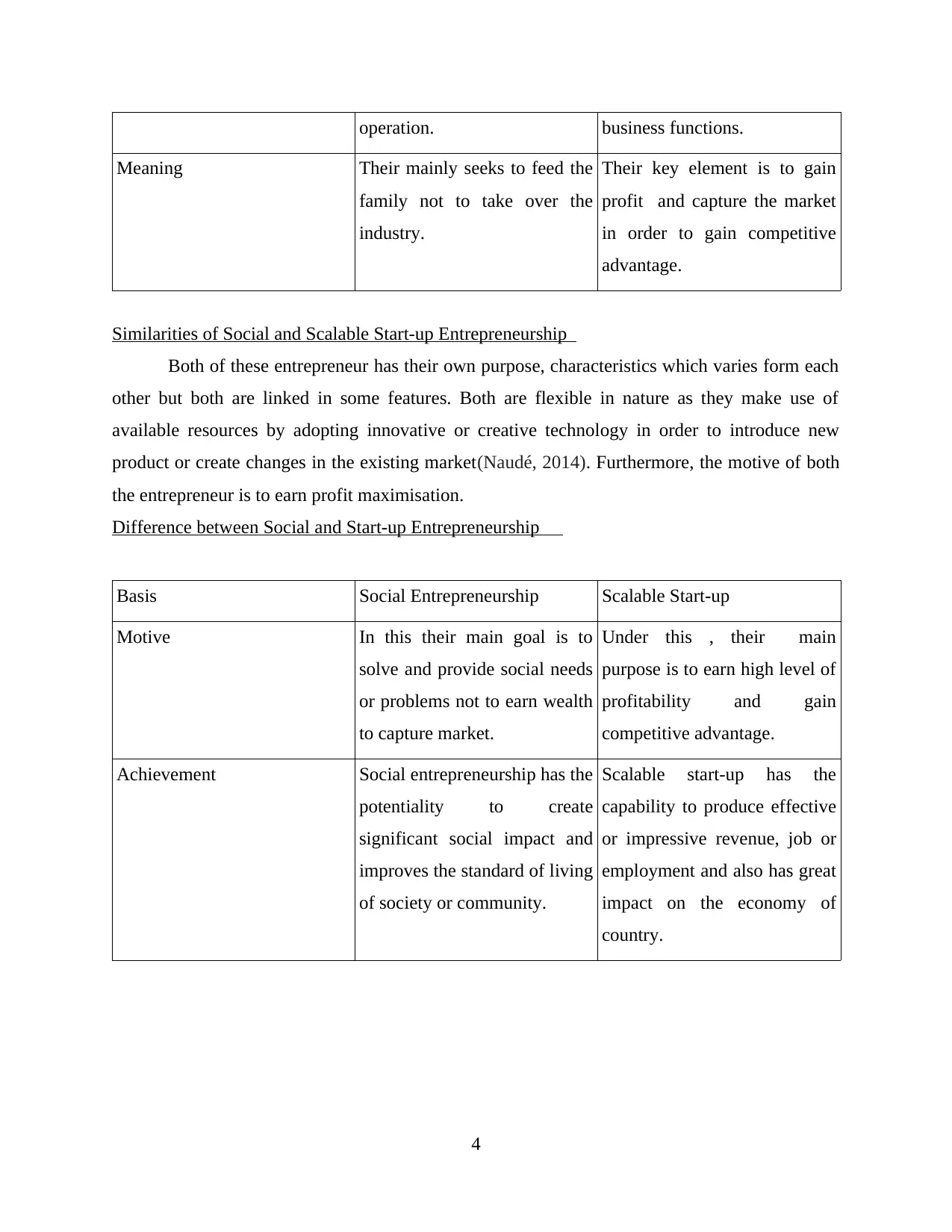
operation. business functions.
Meaning Their mainly seeks to feed the
family not to take over the
industry.
Their key element is to gain
profit and capture the market
in order to gain competitive
advantage.
Similarities of Social and Scalable Start-up Entrepreneurship
Both of these entrepreneur has their own purpose, characteristics which varies form each
other but both are linked in some features. Both are flexible in nature as they make use of
available resources by adopting innovative or creative technology in order to introduce new
product or create changes in the existing market(Naudé, 2014). Furthermore, the motive of both
the entrepreneur is to earn profit maximisation.
Difference between Social and Start-up Entrepreneurship
Basis Social Entrepreneurship Scalable Start-up
Motive In this their main goal is to
solve and provide social needs
or problems not to earn wealth
to capture market.
Under this , their main
purpose is to earn high level of
profitability and gain
competitive advantage.
Achievement Social entrepreneurship has the
potentiality to create
significant social impact and
improves the standard of living
of society or community.
Scalable start-up has the
capability to produce effective
or impressive revenue, job or
employment and also has great
impact on the economy of
country.
4
Meaning Their mainly seeks to feed the
family not to take over the
industry.
Their key element is to gain
profit and capture the market
in order to gain competitive
advantage.
Similarities of Social and Scalable Start-up Entrepreneurship
Both of these entrepreneur has their own purpose, characteristics which varies form each
other but both are linked in some features. Both are flexible in nature as they make use of
available resources by adopting innovative or creative technology in order to introduce new
product or create changes in the existing market(Naudé, 2014). Furthermore, the motive of both
the entrepreneur is to earn profit maximisation.
Difference between Social and Start-up Entrepreneurship
Basis Social Entrepreneurship Scalable Start-up
Motive In this their main goal is to
solve and provide social needs
or problems not to earn wealth
to capture market.
Under this , their main
purpose is to earn high level of
profitability and gain
competitive advantage.
Achievement Social entrepreneurship has the
potentiality to create
significant social impact and
improves the standard of living
of society or community.
Scalable start-up has the
capability to produce effective
or impressive revenue, job or
employment and also has great
impact on the economy of
country.
4
Paraphrase This Document
Need a fresh take? Get an instant paraphrase of this document with our AI Paraphraser
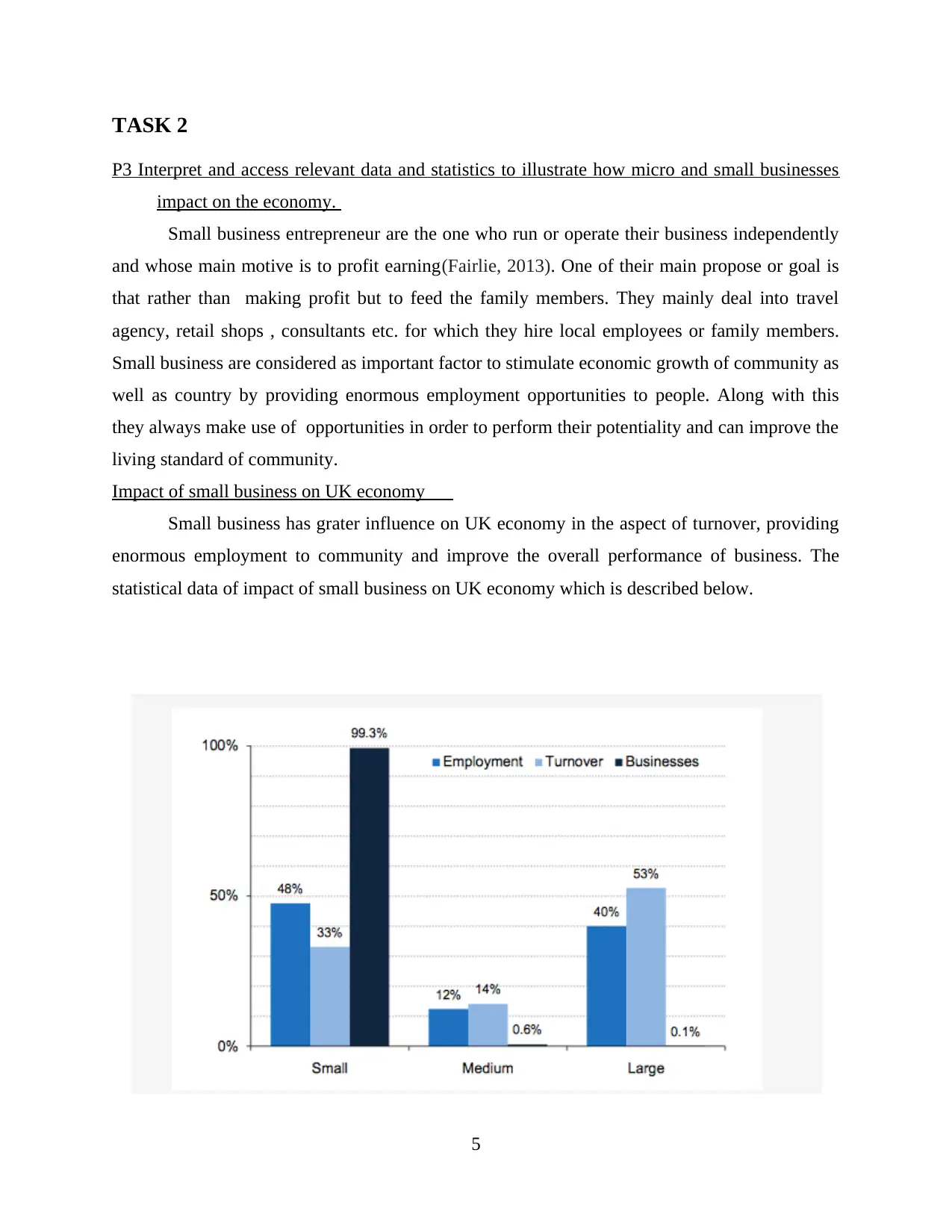
TASK 2
P3 Interpret and access relevant data and statistics to illustrate how micro and small businesses
impact on the economy.
Small business entrepreneur are the one who run or operate their business independently
and whose main motive is to profit earning(Fairlie, 2013). One of their main propose or goal is
that rather than making profit but to feed the family members. They mainly deal into travel
agency, retail shops , consultants etc. for which they hire local employees or family members.
Small business are considered as important factor to stimulate economic growth of community as
well as country by providing enormous employment opportunities to people. Along with this
they always make use of opportunities in order to perform their potentiality and can improve the
living standard of community.
Impact of small business on UK economy
Small business has grater influence on UK economy in the aspect of turnover, providing
enormous employment to community and improve the overall performance of business. The
statistical data of impact of small business on UK economy which is described below.
5
P3 Interpret and access relevant data and statistics to illustrate how micro and small businesses
impact on the economy.
Small business entrepreneur are the one who run or operate their business independently
and whose main motive is to profit earning(Fairlie, 2013). One of their main propose or goal is
that rather than making profit but to feed the family members. They mainly deal into travel
agency, retail shops , consultants etc. for which they hire local employees or family members.
Small business are considered as important factor to stimulate economic growth of community as
well as country by providing enormous employment opportunities to people. Along with this
they always make use of opportunities in order to perform their potentiality and can improve the
living standard of community.
Impact of small business on UK economy
Small business has grater influence on UK economy in the aspect of turnover, providing
enormous employment to community and improve the overall performance of business. The
statistical data of impact of small business on UK economy which is described below.
5
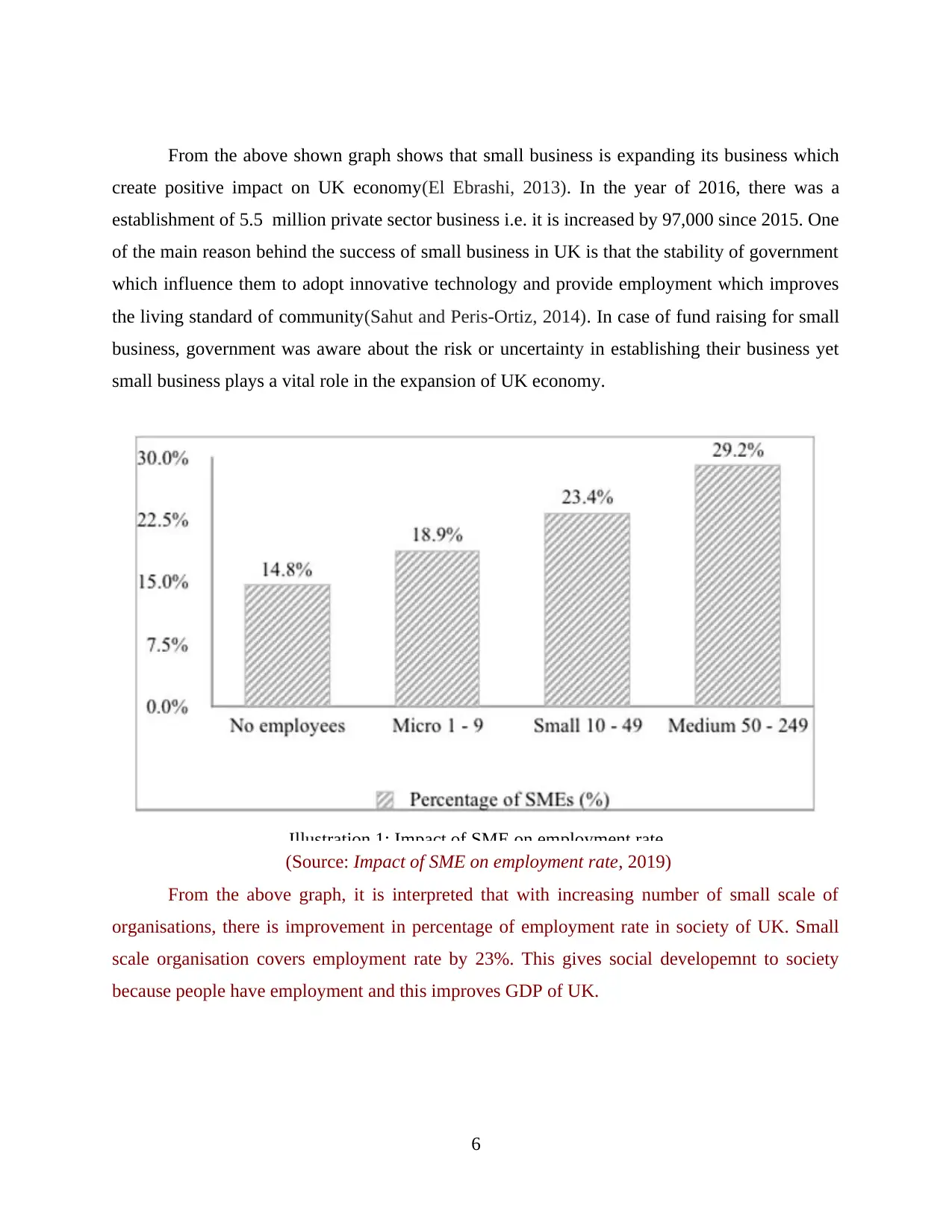
From the above shown graph shows that small business is expanding its business which
create positive impact on UK economy(El Ebrashi, 2013). In the year of 2016, there was a
establishment of 5.5 million private sector business i.e. it is increased by 97,000 since 2015. One
of the main reason behind the success of small business in UK is that the stability of government
which influence them to adopt innovative technology and provide employment which improves
the living standard of community(Sahut and Peris-Ortiz, 2014). In case of fund raising for small
business, government was aware about the risk or uncertainty in establishing their business yet
small business plays a vital role in the expansion of UK economy.
(Source: Impact of SME on employment rate, 2019)
From the above graph, it is interpreted that with increasing number of small scale of
organisations, there is improvement in percentage of employment rate in society of UK. Small
scale organisation covers employment rate by 23%. This gives social developemnt to society
because people have employment and this improves GDP of UK.
6
Illustration 1: Impact of SME on employment rate
create positive impact on UK economy(El Ebrashi, 2013). In the year of 2016, there was a
establishment of 5.5 million private sector business i.e. it is increased by 97,000 since 2015. One
of the main reason behind the success of small business in UK is that the stability of government
which influence them to adopt innovative technology and provide employment which improves
the living standard of community(Sahut and Peris-Ortiz, 2014). In case of fund raising for small
business, government was aware about the risk or uncertainty in establishing their business yet
small business plays a vital role in the expansion of UK economy.
(Source: Impact of SME on employment rate, 2019)
From the above graph, it is interpreted that with increasing number of small scale of
organisations, there is improvement in percentage of employment rate in society of UK. Small
scale organisation covers employment rate by 23%. This gives social developemnt to society
because people have employment and this improves GDP of UK.
6
Illustration 1: Impact of SME on employment rate
⊘ This is a preview!⊘
Do you want full access?
Subscribe today to unlock all pages.

Trusted by 1+ million students worldwide
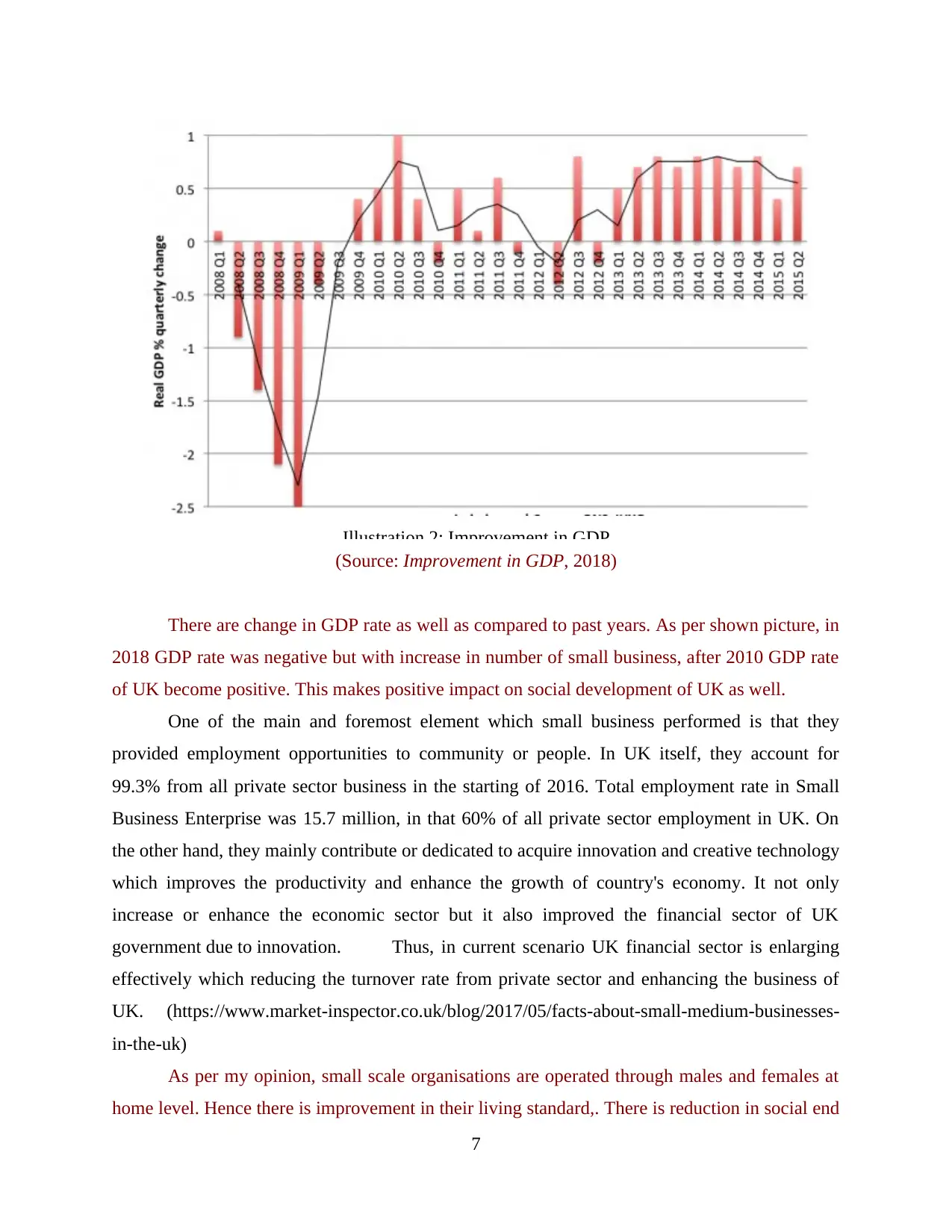
(Source: Improvement in GDP, 2018)
There are change in GDP rate as well as compared to past years. As per shown picture, in
2018 GDP rate was negative but with increase in number of small business, after 2010 GDP rate
of UK become positive. This makes positive impact on social development of UK as well.
One of the main and foremost element which small business performed is that they
provided employment opportunities to community or people. In UK itself, they account for
99.3% from all private sector business in the starting of 2016. Total employment rate in Small
Business Enterprise was 15.7 million, in that 60% of all private sector employment in UK. On
the other hand, they mainly contribute or dedicated to acquire innovation and creative technology
which improves the productivity and enhance the growth of country's economy. It not only
increase or enhance the economic sector but it also improved the financial sector of UK
government due to innovation. Thus, in current scenario UK financial sector is enlarging
effectively which reducing the turnover rate from private sector and enhancing the business of
UK. (https://www.market-inspector.co.uk/blog/2017/05/facts-about-small-medium-businesses-
in-the-uk)
As per my opinion, small scale organisations are operated through males and females at
home level. Hence there is improvement in their living standard,. There is reduction in social end
7
Illustration 2: Improvement in GDP
There are change in GDP rate as well as compared to past years. As per shown picture, in
2018 GDP rate was negative but with increase in number of small business, after 2010 GDP rate
of UK become positive. This makes positive impact on social development of UK as well.
One of the main and foremost element which small business performed is that they
provided employment opportunities to community or people. In UK itself, they account for
99.3% from all private sector business in the starting of 2016. Total employment rate in Small
Business Enterprise was 15.7 million, in that 60% of all private sector employment in UK. On
the other hand, they mainly contribute or dedicated to acquire innovation and creative technology
which improves the productivity and enhance the growth of country's economy. It not only
increase or enhance the economic sector but it also improved the financial sector of UK
government due to innovation. Thus, in current scenario UK financial sector is enlarging
effectively which reducing the turnover rate from private sector and enhancing the business of
UK. (https://www.market-inspector.co.uk/blog/2017/05/facts-about-small-medium-businesses-
in-the-uk)
As per my opinion, small scale organisations are operated through males and females at
home level. Hence there is improvement in their living standard,. There is reduction in social end
7
Illustration 2: Improvement in GDP
Paraphrase This Document
Need a fresh take? Get an instant paraphrase of this document with our AI Paraphraser
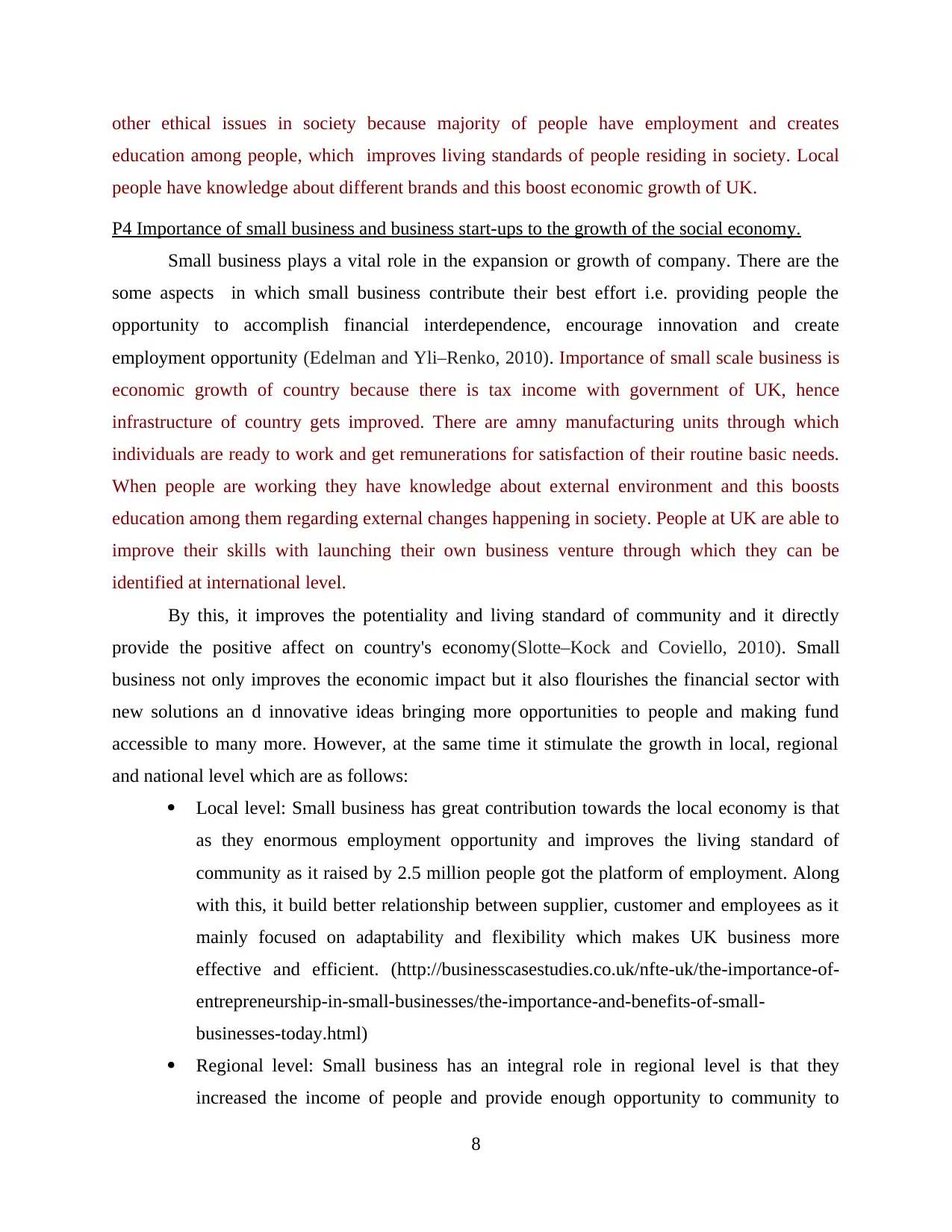
other ethical issues in society because majority of people have employment and creates
education among people, which improves living standards of people residing in society. Local
people have knowledge about different brands and this boost economic growth of UK.
P4 Importance of small business and business start-ups to the growth of the social economy.
Small business plays a vital role in the expansion or growth of company. There are the
some aspects in which small business contribute their best effort i.e. providing people the
opportunity to accomplish financial interdependence, encourage innovation and create
employment opportunity (Edelman and Yli–Renko, 2010). Importance of small scale business is
economic growth of country because there is tax income with government of UK, hence
infrastructure of country gets improved. There are amny manufacturing units through which
individuals are ready to work and get remunerations for satisfaction of their routine basic needs.
When people are working they have knowledge about external environment and this boosts
education among them regarding external changes happening in society. People at UK are able to
improve their skills with launching their own business venture through which they can be
identified at international level.
By this, it improves the potentiality and living standard of community and it directly
provide the positive affect on country's economy(Slotte–Kock and Coviello, 2010). Small
business not only improves the economic impact but it also flourishes the financial sector with
new solutions an d innovative ideas bringing more opportunities to people and making fund
accessible to many more. However, at the same time it stimulate the growth in local, regional
and national level which are as follows:
Local level: Small business has great contribution towards the local economy is that
as they enormous employment opportunity and improves the living standard of
community as it raised by 2.5 million people got the platform of employment. Along
with this, it build better relationship between supplier, customer and employees as it
mainly focused on adaptability and flexibility which makes UK business more
effective and efficient. (http://businesscasestudies.co.uk/nfte-uk/the-importance-of-
entrepreneurship-in-small-businesses/the-importance-and-benefits-of-small-
businesses-today.html)
Regional level: Small business has an integral role in regional level is that they
increased the income of people and provide enough opportunity to community to
8
education among people, which improves living standards of people residing in society. Local
people have knowledge about different brands and this boost economic growth of UK.
P4 Importance of small business and business start-ups to the growth of the social economy.
Small business plays a vital role in the expansion or growth of company. There are the
some aspects in which small business contribute their best effort i.e. providing people the
opportunity to accomplish financial interdependence, encourage innovation and create
employment opportunity (Edelman and Yli–Renko, 2010). Importance of small scale business is
economic growth of country because there is tax income with government of UK, hence
infrastructure of country gets improved. There are amny manufacturing units through which
individuals are ready to work and get remunerations for satisfaction of their routine basic needs.
When people are working they have knowledge about external environment and this boosts
education among them regarding external changes happening in society. People at UK are able to
improve their skills with launching their own business venture through which they can be
identified at international level.
By this, it improves the potentiality and living standard of community and it directly
provide the positive affect on country's economy(Slotte–Kock and Coviello, 2010). Small
business not only improves the economic impact but it also flourishes the financial sector with
new solutions an d innovative ideas bringing more opportunities to people and making fund
accessible to many more. However, at the same time it stimulate the growth in local, regional
and national level which are as follows:
Local level: Small business has great contribution towards the local economy is that
as they enormous employment opportunity and improves the living standard of
community as it raised by 2.5 million people got the platform of employment. Along
with this, it build better relationship between supplier, customer and employees as it
mainly focused on adaptability and flexibility which makes UK business more
effective and efficient. (http://businesscasestudies.co.uk/nfte-uk/the-importance-of-
entrepreneurship-in-small-businesses/the-importance-and-benefits-of-small-
businesses-today.html)
Regional level: Small business has an integral role in regional level is that they
increased the income of people and provide enough opportunity to community to
8
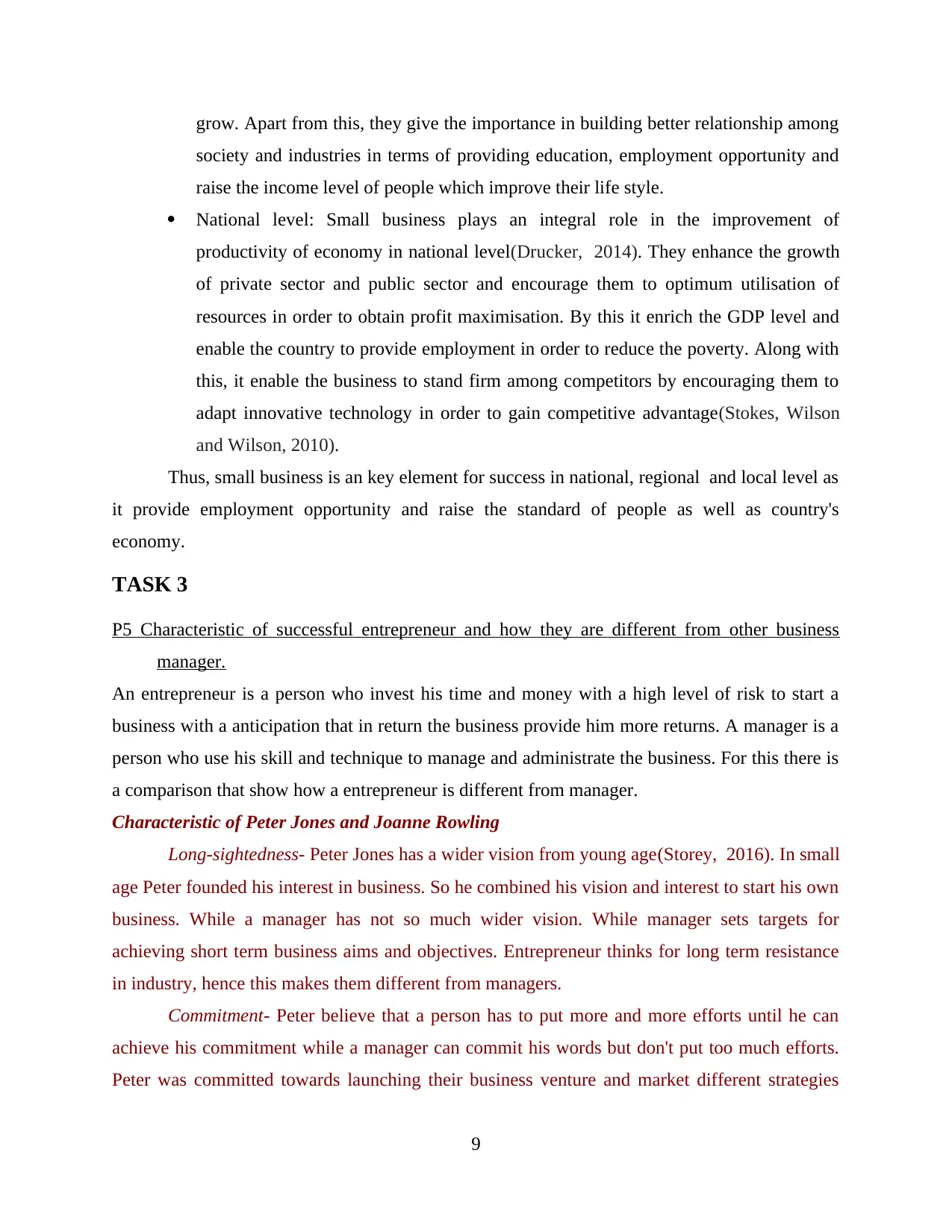
grow. Apart from this, they give the importance in building better relationship among
society and industries in terms of providing education, employment opportunity and
raise the income level of people which improve their life style.
National level: Small business plays an integral role in the improvement of
productivity of economy in national level(Drucker, 2014). They enhance the growth
of private sector and public sector and encourage them to optimum utilisation of
resources in order to obtain profit maximisation. By this it enrich the GDP level and
enable the country to provide employment in order to reduce the poverty. Along with
this, it enable the business to stand firm among competitors by encouraging them to
adapt innovative technology in order to gain competitive advantage(Stokes, Wilson
and Wilson, 2010).
Thus, small business is an key element for success in national, regional and local level as
it provide employment opportunity and raise the standard of people as well as country's
economy.
TASK 3
P5 Characteristic of successful entrepreneur and how they are different from other business
manager.
An entrepreneur is a person who invest his time and money with a high level of risk to start a
business with a anticipation that in return the business provide him more returns. A manager is a
person who use his skill and technique to manage and administrate the business. For this there is
a comparison that show how a entrepreneur is different from manager.
Characteristic of Peter Jones and Joanne Rowling
Long-sightedness- Peter Jones has a wider vision from young age(Storey, 2016). In small
age Peter founded his interest in business. So he combined his vision and interest to start his own
business. While a manager has not so much wider vision. While manager sets targets for
achieving short term business aims and objectives. Entrepreneur thinks for long term resistance
in industry, hence this makes them different from managers.
Commitment- Peter believe that a person has to put more and more efforts until he can
achieve his commitment while a manager can commit his words but don't put too much efforts.
Peter was committed towards launching their business venture and market different strategies
9
society and industries in terms of providing education, employment opportunity and
raise the income level of people which improve their life style.
National level: Small business plays an integral role in the improvement of
productivity of economy in national level(Drucker, 2014). They enhance the growth
of private sector and public sector and encourage them to optimum utilisation of
resources in order to obtain profit maximisation. By this it enrich the GDP level and
enable the country to provide employment in order to reduce the poverty. Along with
this, it enable the business to stand firm among competitors by encouraging them to
adapt innovative technology in order to gain competitive advantage(Stokes, Wilson
and Wilson, 2010).
Thus, small business is an key element for success in national, regional and local level as
it provide employment opportunity and raise the standard of people as well as country's
economy.
TASK 3
P5 Characteristic of successful entrepreneur and how they are different from other business
manager.
An entrepreneur is a person who invest his time and money with a high level of risk to start a
business with a anticipation that in return the business provide him more returns. A manager is a
person who use his skill and technique to manage and administrate the business. For this there is
a comparison that show how a entrepreneur is different from manager.
Characteristic of Peter Jones and Joanne Rowling
Long-sightedness- Peter Jones has a wider vision from young age(Storey, 2016). In small
age Peter founded his interest in business. So he combined his vision and interest to start his own
business. While a manager has not so much wider vision. While manager sets targets for
achieving short term business aims and objectives. Entrepreneur thinks for long term resistance
in industry, hence this makes them different from managers.
Commitment- Peter believe that a person has to put more and more efforts until he can
achieve his commitment while a manager can commit his words but don't put too much efforts.
Peter was committed towards launching their business venture and market different strategies
9
⊘ This is a preview!⊘
Do you want full access?
Subscribe today to unlock all pages.

Trusted by 1+ million students worldwide
1 out of 18
Related Documents
Your All-in-One AI-Powered Toolkit for Academic Success.
+13062052269
info@desklib.com
Available 24*7 on WhatsApp / Email
![[object Object]](/_next/static/media/star-bottom.7253800d.svg)
Unlock your academic potential
Copyright © 2020–2026 A2Z Services. All Rights Reserved. Developed and managed by ZUCOL.




